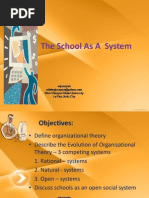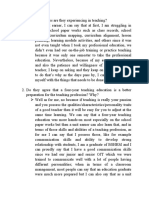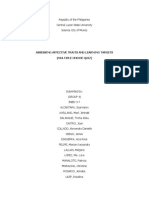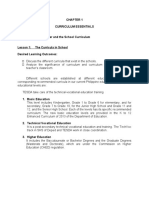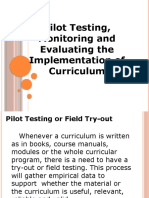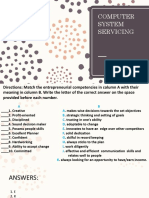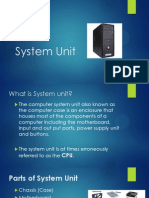Pilot Testing
Pilot Testing
Uploaded by
Michael ZuñigaCopyright:
Available Formats
Pilot Testing
Pilot Testing
Uploaded by
Michael ZuñigaCopyright
Available Formats
Share this document
Did you find this document useful?
Is this content inappropriate?
Copyright:
Available Formats
Pilot Testing
Pilot Testing
Uploaded by
Michael ZuñigaCopyright:
Available Formats
Pilot Testing, Monitoring and Evaluating the Implementation of Curriculum
Pilot Testing or Field Try-out Whenever a curriculum is written as in books, course manuals, modules or the whole curricular program, there is a need to have a try-out or field testing. This process will gather empirical data to support whether the material or the curriculum is useful, relevant, reliable and valid.
Curriculum Monitoring Monitoring is a periodic assessment and adjustment during the try-out period. It is like formative evaluation.
Curriculum Evaluation Curriculum evaluation as part of total educational evaluation refers to a systematic process of judging the value, effectiveness and adequacy of a curriculum. Evaluation should be useful and systematic. The information gathered should be important for the improvement of and for final judgment of the curriculum being evaluated.
In practice, there are two ways of curriculum evaluation 1. School-based evaluation 2. Accreditation
School-Based Evaluation - is an approach to curriculum evaluation which places the content, design, operation and maintenance of evaluation procedure in the hands of the school personnel. The school personnel participate in the planning and conduct of school evaluation where the control and management of the process rest on the school personnel themselves.
Accreditation This is a voluntary process of submitting a curricular program to an external accrediting body for review in any level of education: basic, tertiary or graduate school to assure standard. Accreditation studies the statement of the educational intentions of the school and affirms a standard of excellence.
Areas of Accreditation under Curriculum and Instruction 1. Curriculum and Program Studies 2. Classroom Management 3. Instructional Processes or Methodologies 4. Graduation Requirements 5. Administrative Support for Effective Instruction 6. Evaluation of Academic Performance of Students
Curriculum and Program of Studies Program of studies includes the clusters of knowledge, skills, attitudes, values and experiences that will provide the students at any level with the necessary competencies for effective learning. A list of subjects or courses to be taken and arrange in logical order compose the program of studies.
Classroom Management The teacher who implements the curriculum sees to it that management of teaching and learning in the classroom follows procedure and guidance to enhance and create an environment conducive to learning. An environment conducive to learning considers the physical as well as the human factors.
Instructional Processes or Methodologies The decision of choosing and using the method of teaching is a crucial factor in curriculum and instruction. There are varied methodologies that are compatible with the different learning style of the students. These emerging strategies of teaching follow principles and theories that enhance learning outcomes.
Graduation Requirements Graduation means successful accomplishment of the curricular program of studies. A student has to accomplish its academic program as prescribed in the program of studies. These requirements are clearly understood upon enrollment in college by the students and by the parents for students in the elementary or high school. The grade requirements of each subjects should be known.
Administrative Support for Effective Instruction
A curriculum can be best implemented if there is support of the school administration.
Evaluation of Academic Performance Of Students In curriculum, it is necessary that learning outcomes be evaluated. After all the best measure of a curriculum is the learning outcome of the students. The evaluation of students performance should make use of valid and reliable tools which are periodically reviewed and revised.
You might also like
- Facilitating Learning - Module 2 - Learner Centered Psychological Principles (LCP)Document10 pagesFacilitating Learning - Module 2 - Learner Centered Psychological Principles (LCP)Rhys LaciaNo ratings yet
- Approaches To School CurriculumDocument22 pagesApproaches To School CurriculumMarigen D. Luche100% (1)
- Purposes of Instructional Goals and ObjectivesDocument8 pagesPurposes of Instructional Goals and ObjectivesRoman JOhn Bacaron ParingNo ratings yet
- The School As A SystemDocument20 pagesThe School As A SystemSheiryl GabaldonNo ratings yet
- Curriculum ImplementationDocument11 pagesCurriculum ImplementationMajjesty Anne Villahermosa Caumeran88% (8)
- My Report in Assessment 1Document67 pagesMy Report in Assessment 1Eddie Wilson Broqueza100% (1)
- Pilot Testing, Monitoring and Evaluating The Implementation of The CurriculumDocument34 pagesPilot Testing, Monitoring and Evaluating The Implementation of The CurriculumJoshua Dela Cruz Rogador100% (2)
- Pilot Testing Monitoring Evaluating The CurriculumDocument34 pagesPilot Testing Monitoring Evaluating The CurriculumPaul Jericho Caranguian100% (2)
- SCRIPTDocument3 pagesSCRIPTCosinas, Lairah Chen B.No ratings yet
- Elements and Components of CurriculumDocument45 pagesElements and Components of Curriculumconnie batucanNo ratings yet
- Tools For Assessing The CurriculumDocument34 pagesTools For Assessing The CurriculumLeoncio Lumaban100% (1)
- Curriculum Development Process ModelsDocument2 pagesCurriculum Development Process Modelscyrene cayananNo ratings yet
- What Is Curriculum Evaluation Importance and RolesDocument17 pagesWhat Is Curriculum Evaluation Importance and RolesAndiNo ratings yet
- Instructional Considerations To Curriculum ImplementationDocument28 pagesInstructional Considerations To Curriculum ImplementationBuried_Child50% (2)
- Module 8.evaluationDocument15 pagesModule 8.evaluationho_thuy_tien90No ratings yet
- Chapter 5 Module 7 Lesson 1Document4 pagesChapter 5 Module 7 Lesson 1Knowme GynnNo ratings yet
- Assessing The CurriculumDocument15 pagesAssessing The CurriculumRamie Arana Bag-ao III100% (1)
- 12-13. Technology Integration in The Curriculum and Outcome Based EducationDocument11 pages12-13. Technology Integration in The Curriculum and Outcome Based EducationJaymar Magtibay100% (1)
- Curriculum Implementation HandoutsDocument3 pagesCurriculum Implementation HandoutsChristine Joy PerionNo ratings yet
- 1.clarity of Learning TargetsDocument23 pages1.clarity of Learning TargetsLeoncio Lumaban20% (5)
- Criteria For CurriculumAssessment - REPORTDocument41 pagesCriteria For CurriculumAssessment - REPORTLeoncio LumabanNo ratings yet
- Module 3Document9 pagesModule 3CHERRY MAE ALVARICONo ratings yet
- Implementing Curriculum As A Change ProcessDocument2 pagesImplementing Curriculum As A Change ProcessNorman C. CalaloNo ratings yet
- Purpose of The CurriculumDocument4 pagesPurpose of The CurriculumMarivic RupilloNo ratings yet
- Topic 2.1: Curriculum Design Model Pre-TestDocument2 pagesTopic 2.1: Curriculum Design Model Pre-TestDalen Bayogbog100% (1)
- NCBTS Introduction, 1& 2Document4 pagesNCBTS Introduction, 1& 2Lewis A. PearlNo ratings yet
- Curriculum EssentialsDocument22 pagesCurriculum EssentialsJheryl M. UnabiaNo ratings yet
- Module V Prof Ed 322Document10 pagesModule V Prof Ed 322JMJ Entertainment VinesNo ratings yet
- Chapter 8 Formative EvaluationDocument17 pagesChapter 8 Formative EvaluationDiana Rose Mendizabal Hamor0% (1)
- Lecture IV High Quality Assessment ComponentsDocument7 pagesLecture IV High Quality Assessment ComponentsJay Fearl VargasNo ratings yet
- ED 8 Chapter 7Document27 pagesED 8 Chapter 7Rolene Bacroya II0% (1)
- What Difficulties Are They Experiencing in TeachingDocument2 pagesWhat Difficulties Are They Experiencing in TeachingJason CatalinoNo ratings yet
- Evaluating The CurriculumDocument10 pagesEvaluating The CurriculumMicky Urielle100% (1)
- Curriculum Planning Sources and InfluencesDocument29 pagesCurriculum Planning Sources and Influencesshaira alliah de castroNo ratings yet
- The Curriculum Should Be Designby Teachers BasedDocument4 pagesThe Curriculum Should Be Designby Teachers BasedRodel YapNo ratings yet
- Approaches in Curriculum DevelopmentDocument2 pagesApproaches in Curriculum DevelopmentDominic Nobleza100% (1)
- School Culture - Principles and TheoriesDocument12 pagesSchool Culture - Principles and TheoriesDengNo ratings yet
- Curriculum Evaluation in The ClassroomDocument1 pageCurriculum Evaluation in The Classroomjunnel mosoNo ratings yet
- Eight PrinciplesDocument2 pagesEight PrinciplesShamera MeraMac PooleNo ratings yet
- Levels of Curriculum ImplementationDocument18 pagesLevels of Curriculum ImplementationLyca Mae Castillo Abacsa100% (1)
- L7 - Graded ActivitiesDocument13 pagesL7 - Graded ActivitiesLoger Kent BernabeNo ratings yet
- Lesson 4 Linkages and Networking With OrganizationDocument13 pagesLesson 4 Linkages and Networking With OrganizationTet LopezNo ratings yet
- Hilda Taba Model LlacunaDocument14 pagesHilda Taba Model Llacunaabigail zagadoNo ratings yet
- QUIZ - AffectiveDocument6 pagesQUIZ - AffectiveAnn Clarice0% (1)
- Chapter 3 Module 4 Lesson 1 Implementing The Designed Curriculum As A Change ProcessDocument12 pagesChapter 3 Module 4 Lesson 1 Implementing The Designed Curriculum As A Change ProcessHazim Gomer Dognap75% (4)
- Module 05. Implementing and Evaluating The CurriculumDocument4 pagesModule 05. Implementing and Evaluating The CurriculumCharlene A. BoNo ratings yet
- ED 213-Implementing Curriculum As A Change Process Written Report - CMESPIRITUDocument8 pagesED 213-Implementing Curriculum As A Change Process Written Report - CMESPIRITUChistine Rose Espiritu0% (1)
- Insturctional MaterialDocument4 pagesInsturctional Materialimie aldoyesaNo ratings yet
- Grading and Reporting System: TopicsDocument13 pagesGrading and Reporting System: TopicsLoger Kent Bernabe100% (1)
- Intended Vs Implemented Vs Achieved CurriculumDocument36 pagesIntended Vs Implemented Vs Achieved CurriculumMark100% (3)
- EDUC - Module 5.1 - DiscussionDocument7 pagesEDUC - Module 5.1 - DiscussionJM INOCENTE CALANAO100% (1)
- Curriculum Change and ImprovementDocument3 pagesCurriculum Change and ImprovementRowly Pearl Iradiel NedicNo ratings yet
- Curriculum DesignDocument24 pagesCurriculum DesignHaziqah Izam100% (2)
- MODELS OF CURRICULUM EVALUATION - TYler, Cronbach, StakesDocument21 pagesMODELS OF CURRICULUM EVALUATION - TYler, Cronbach, StakesJithu B Alex100% (2)
- Curriculum As Subject MatterDocument2 pagesCurriculum As Subject MatterRyxie Bulgado86% (7)
- Chapter 1 Modules 1 2Document23 pagesChapter 1 Modules 1 2Kreizel FajaNo ratings yet
- Ed 301 - The Teacher and The School CurriculumDocument5 pagesEd 301 - The Teacher and The School CurriculumRoland Jr100% (1)
- The Organizational Structure of Philippine EducationDocument31 pagesThe Organizational Structure of Philippine Educationelaine balcueva100% (4)
- Through the Looking-Glass, and What Alice Found There: Unabridged with the Original Illustrations by John TennielFrom EverandThrough the Looking-Glass, and What Alice Found There: Unabridged with the Original Illustrations by John TennielNo ratings yet
- Pilot Testing, Monitoring and Evaluating The Implementation of CurriculumDocument16 pagesPilot Testing, Monitoring and Evaluating The Implementation of CurriculumJered MoratoNo ratings yet
- General Emilio Aguinalado National Highschool: PC Assembly/Disassembly With Software InstallationDocument2 pagesGeneral Emilio Aguinalado National Highschool: PC Assembly/Disassembly With Software InstallationMichael Zuñiga100% (2)
- PecsDocument14 pagesPecsMichael ZuñigaNo ratings yet
- Web Page Designing Contest: General Emilio Aguinalado National HighschoolDocument4 pagesWeb Page Designing Contest: General Emilio Aguinalado National HighschoolMichael ZuñigaNo ratings yet
- Guess: The LogoDocument20 pagesGuess: The LogoMichael ZuñigaNo ratings yet
- Masking Tape Drawing PaperDocument6 pagesMasking Tape Drawing PaperMichael ZuñigaNo ratings yet
- Internal Parts of S.UDocument23 pagesInternal Parts of S.UMichael ZuñigaNo ratings yet
- Lesson PlanningDocument2 pagesLesson PlanningMichael Zuñiga100% (1)
- CBT Process FlowDocument3 pagesCBT Process FlowRey Lord Yumol Panganiban100% (1)
- The Power Supply 1Document17 pagesThe Power Supply 1Michael ZuñigaNo ratings yet
- PC Memory (RAM) : Computer Memory Type Information, Help Buy The Correct TypeDocument25 pagesPC Memory (RAM) : Computer Memory Type Information, Help Buy The Correct TypeMichael ZuñigaNo ratings yet
- The Effectiveness of Stress Management Training PRDocument8 pagesThe Effectiveness of Stress Management Training PRGretaNo ratings yet
- The Undergraduate Handbook 2020-21Document91 pagesThe Undergraduate Handbook 2020-21jack priceNo ratings yet
- Script Template - Table Topics MasterDocument2 pagesScript Template - Table Topics MasterYash MaheshwariNo ratings yet
- Cover Letter 2Document2 pagesCover Letter 2Saahil MadanNo ratings yet
- Mechanic Resume SampleDocument5 pagesMechanic Resume Samplefzdpofajd100% (2)
- 10th Grade Portfolio HandbookDocument10 pages10th Grade Portfolio Handbookkartik PujariNo ratings yet
- CBLM Template Preliminary PagesDocument9 pagesCBLM Template Preliminary PagesCharybelle MaglayaNo ratings yet
- Diorama RubricDocument1 pageDiorama RubricJeje NutNo ratings yet
- 2023NLC Monitoring ToolDocument7 pages2023NLC Monitoring ToolMyra CasapaoNo ratings yet
- Criminology & Behavioural Psychology: (Professional Graduate Diploma in Counter Terrorism and Security)Document26 pagesCriminology & Behavioural Psychology: (Professional Graduate Diploma in Counter Terrorism and Security)Von DominicNo ratings yet
- Course Name: Level: Course Code: 8606 Semester: Spring 2023 Assignment: 1 Due Date: 15-08-2023 Total Assignment: 2 Late Date: 15-09-2023Document11 pagesCourse Name: Level: Course Code: 8606 Semester: Spring 2023 Assignment: 1 Due Date: 15-08-2023 Total Assignment: 2 Late Date: 15-09-2023حارث میوNo ratings yet
- TroductionDocument123 pagesTroductionChidoluo Joseph UgboNo ratings yet
- Tenth Class Model Paper: Public Examinations - 2019 English Paper - IDocument3 pagesTenth Class Model Paper: Public Examinations - 2019 English Paper - IVamsiNo ratings yet
- Prelim Exam and Proctoring Sched 23 24 Final 031524 11am by CourseDocument15 pagesPrelim Exam and Proctoring Sched 23 24 Final 031524 11am by Coursegilamonsheenajoy88No ratings yet
- 10-5 Catch Up FridaysDocument4 pages10-5 Catch Up FridaysJoel Igno TadeoNo ratings yet
- Aaa Pro Write Resume ServicesDocument7 pagesAaa Pro Write Resume Servicesgt68qmff100% (1)
- Catch Up Friday ResearchDocument1 pageCatch Up Friday Researchlalovesko47No ratings yet
- Levels of Stylistic AnalysisDocument12 pagesLevels of Stylistic AnalysisRJEREENo ratings yet
- Brian Morrissey - ResumeDocument1 pageBrian Morrissey - Resumeapi-345474349No ratings yet
- Unit 1 Study GuideDocument28 pagesUnit 1 Study GuideMinh LeNo ratings yet
- BSE3 Final Copy ResearchDocument57 pagesBSE3 Final Copy Researchjobella BudihNo ratings yet
- With The Fire On High Book Review-2Document1 pageWith The Fire On High Book Review-2api-485419004No ratings yet
- Collaborative Presentation Inclass Online Oral Rubric GenericDocument4 pagesCollaborative Presentation Inclass Online Oral Rubric GenericVallerie ServanoNo ratings yet
- Cot 1 2020-2021Document5 pagesCot 1 2020-2021Sinned NozidNo ratings yet
- Sample Quali Stepping Out of Ones Comfort Zone Students Transition From Public To Private Schools Arada Et Al. 2017Document66 pagesSample Quali Stepping Out of Ones Comfort Zone Students Transition From Public To Private Schools Arada Et Al. 2017mcchristgranil028No ratings yet
- Berry SpellingDocument16 pagesBerry SpellingCassyNo ratings yet
- Faces of Indian Women: Urvashi ButaliaDocument28 pagesFaces of Indian Women: Urvashi ButaliasharuNo ratings yet
- DPE 102 The Teaching Profession 2 DONEDocument30 pagesDPE 102 The Teaching Profession 2 DONEWilmer UnabiaNo ratings yet
- Poetry Read Aloud Lesson e UnitDocument5 pagesPoetry Read Aloud Lesson e Unitapi-272755804No ratings yet
- Debugging ActivitiesDocument6 pagesDebugging Activitiesapi-350095594No ratings yet



